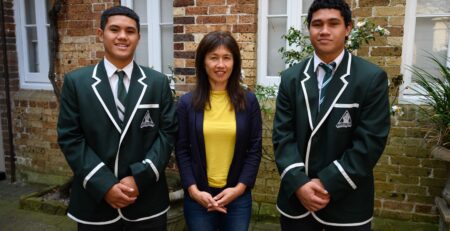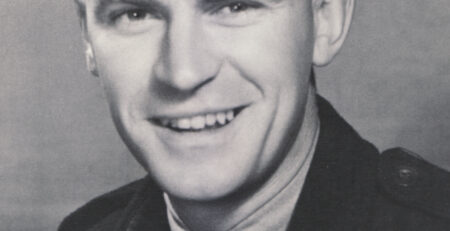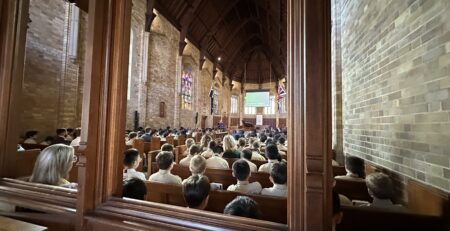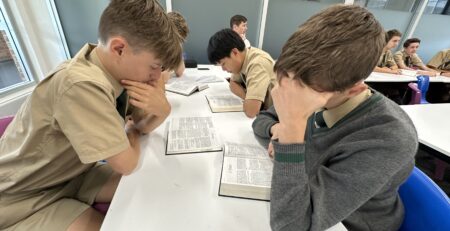Prep | Year 3 News
Maths
The past two weeks have seen a busy start for Year 3 boys. We have looked at angles, 2D shapes and next week we move onto 3D objects. Students have shown great prior knowledge in these areas, as they gave examples of different types of angles and shapes. They have learnt to use correct terminology when discussing angles and 2D shapes including but not limited to: two-dimensional shape (2D shape), quadrilateral, parallelogram, rectangle, rhombus, square, trapezium, kite, pentagon, regular shape, irregular shape, orientation, features, properties, side, parallel, pair of parallel sides, opposite, length, vertex (vertices), angle, right angle, symmetry, line (axis) of symmetry, rigid.
As we move onto 3D objects, students will identify and name a range of prisms and pyramids. Students will get hands-on in creating models of prisms (including cubes), pyramids, cylinders, cones and spheres, using a range of materials. They will also describe and compare curved surfaces and flat surfaces of cylinders, cones and spheres, and faces, edges and vertices of prisms (including cubes) and pyramids.
Throughout our lessons there is a focus on using up to date terminology with students. In saying this, there are usually changes of what is now ‘correct’ since many of us were in Year 3. We have discussed that the term ‘diamond’ is often used in everyday contexts when describing quadrilaterals with four equal sides. However, ‘diamond’ is not the correct geometrical term to name such quadrilaterals; the correct term is ‘rhombus’.
Another change is that the term ‘face’ refers to a flat surface with only straight edges, as in prisms and pyramids, e.g. a cube has six faces. Curved surfaces, such as those found in cylinders, cones and spheres, are not classified as ‘faces’. Similarly, flat surfaces with curved boundaries, such as the circular surfaces of cylinders and cones, are not ‘faces’.
English
During the beginning of this term there is a focus on script writing which has already shown that Year 3 are truly a creative bunch. In class we have looked at the conventions of script writing which has allowed students to understand what is needed when writing their own scripts. Boys have already written a few scripts, including an advertisement for a product they would like to sell and a script to show others how to ‘Be Kind, Be Considerate, Be Ready to Learn, and Be Respectful’. They have shown engagement throughout these lessons as they write, practise, and record their scripts all while working well within groups.
Currently boys are rehearsing for a puppet show where they will practise with their group, create props, perform and record for their Year 3 audience. It has been great seeing boys undertake such a wide range of roles throughout these lessons and be open to new experiences.
The second half of the term will see Year 3 embark on their road to journalism by creating their own newspaper.
Unit of Inquiry
In Weeks 1 and 2 we focused back on our unit of inquiry ‘Who we are’. Our central idea for these weeks was ‘Individuals and communities grow by appreciating rights and responsibilities’. In our lessons, we discussed the importance of a growth mindset and how this can help us push through tough times. Boys discussed times they have had a fixed mindset and what they did to move themselves into a growth mindset. We hope that as they continue through Trinity, they remember these key lessons.
Week 3 saw the start of our new Transdisciplinary unit ‘How we express ourselves’. Within this unit we will look into the following:
Central Idea: Expression enriches our world
Lines of Inquiry
1. What defines expression? (form)
2. Being open-minded leads to appreciating differences (perspective)
3. Expression connects us to the world we live in (Connection)
Throughout this unit Year 3 boys will engage in rotational groups with a focus on various forms of expression. This includes drama, cooking, fashion, dance, music and design. The hope with this unit is that boys will gain an understanding of the many ways people express themselves, as well as showing an appreciation that everyone is different and enjoys different experiences.
Christian Studies
Our School has a strong and long tradition of supporting charities. These include local, national and international charities – sometimes groups and individuals. This term, the boys will be exploring who we support, what we do and why we do it. They will be using their social and communication skills to research one of the charities / organisations we support. The hope is to inspire the boys to find and discover ways that they can take action within and outside of school to help others. In Chapel, we will be investigating how we celebrate Christmas – do we have the story correct and what place do food, feasting and fellowship have? How can all these wonderful aspects enhance our experience of Christmas without taking away from the central message of Jesus’ birth.
Mandarin
Over the past weeks, the Year 3 boys reviewed the vocabulary about self-introduction and greetings using “Education Perfect ” online learning tool. They continue to develop their communication skills with a focus on the words for feelings and emotions. There is also a strong emphasis on recognising their emotions and respect for other feelings. The boys learn to convey their knowledge of these related themes through the composition of a role play in Chinese.
We will soon be inquiring into the design of Chinese opera masks in expressing emotions and personality traits linking with the Unit of Inquiry “How We Express Ourselves”. This discovery journey will enrich the student’s perspectives on how different cultural expressions help to enrich our world.




PDHPE
Term 4 at Trinity always feels like the end of a marathon race is finally in sight! With so much to do and so many preparations to be made for 2023, the boys continue to be fully engaged in all facets of school life. I continue to be thoroughly impressed with the determination, skill development and good humour that each class brings to their PDHPE lessons. This is a year group that will continue to thrive at Trinity and are well placed to be fine leaders in the future. This term we are focussing on two units of work. Athletic Performance. The central idea is understanding body systems and how mechanics allows us to maximise athletic potential. The second is Rhythmic Movement. The central idea revolves around dance and how it allows for the exploration of transferable body movements. Our FAST skill is Static Balance. I also look forward to interacting with you next Tuesday night for the Student Led Conferences. The PDHPE staff will be in the gym and have all current K-6 FAST skills set up for the boys to demonstrate for you and allow you to have a go as well.



















